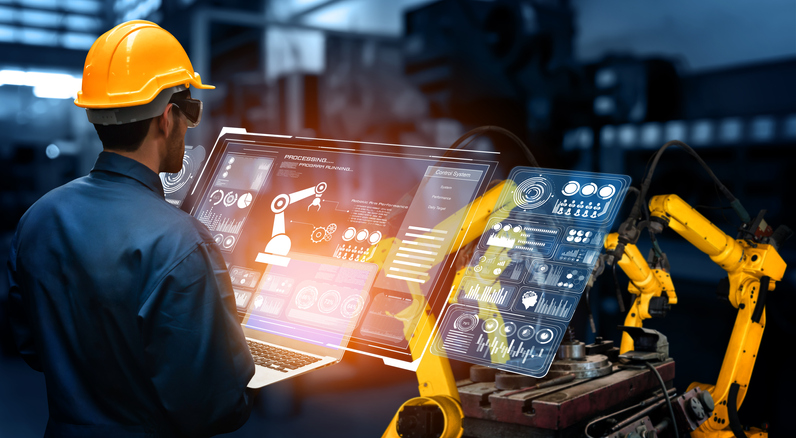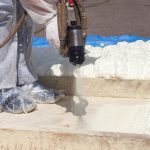Artificial Intelligence is Powering Industry 4.0
Unless you’ve been stuck on a desert island, it is impossible to ignore the rise of artificial intelligence in 2023. Advancements in AI have energized business applications across every industry, including manufacturing. AI in manufacturing is transforming and redefining how factories operate, boosting efficiency, and driving innovation. Even manufacturers working with polyurethane can benefit from the adoption of this technology.
In broad terms, artificial intelligence refers to the simulation of human intelligence in machines — be it a computer or a robot assembling parts. AI empowers devices to do tasks that traditionally have been strictly human-related, such as visual perception, speech recognition, and decision-making. In manufacturing, AI is used to enhance automation, greater quality control, predictive maintenance, and process optimization.
Still, in its relative infancy, investment in AI for manufacturing is expected to grow significantly in the near future. One estimate has the market growing from $1.1 billion in 2020 to $16.7 billion by 2026. Much of the influx in funding is chalked up to capitalizing on the availability of big data, furthering industrial automation, and larger capital investments.
Today, we’ll delve into the world of artificial intelligence in manufacturing, exploring its benefits, the types of tasks it handles, and its future implications.
Ready to Get Started? Reach out to Linden Polyurethane to learn more about how we support your goals or request a quote.
Benefits of AI in Manufacturing
Enhanced Efficiency
AI-driven automation streamlines manufacturing processes, reducing human errors, and increasing production efficiency. Robotics integrated with Industry 4.0 technology, including AI, can enable ‘lights out’ manufacturing resulting in higher productivity.
Improved Quality Control
AI-powered systems can detect even the slightest defects in products, ensuring consistently high-quality output. This minimizes product recalls and enhances customer satisfaction.
Predictive Maintenance
AI algorithms analyze real-time data from today’s IoT technology to predict when equipment is likely to fail. This allows for proactive maintenance, reducing downtime and saving costs.
Supply Chain Optimization
AI helps optimize supply chain operations by predicting demand, managing inventory, and optimizing routes for transportation. This leads to cost savings and better customer service.
Customization & Personalization
AI-driven manufacturing allows for the efficient production of customized products at scale, catering to individual customer preferences.
Energy Efficiency
AI systems optimize energy consumption in manufacturing facilities, reducing environmental impact and operational costs.
Future Trends for AI in Manufacturing
While the potential benefits of AI in industrial production are plentiful, there are hurdles to overcome in putting it to use fully. There is an upfront cost to implementing AI systems and the need for a skilled workforce to manage and maintain them. Additionally, there are concerns about data security and privacy as it relates to AI, not just in manufacturing but in its widespread adoption as a whole.
Despite those challenges, the future implications of AI are exciting and full of additional possibilities. Here are a few trends to watch:
Collaborative Robots (Cobots) — Cobots are already in use in many manufacturing facilities. These robots work alongside their human counterparts and are becoming more prevalent as they offer flexibility and safety in arduous or potentially dangerous processes.
Digital Twins — Driven by AI, this process creates a virtual replica of physical assets, allowing for real-time monitoring, optimization, and testing of an industrial or manufacturing environment.
Sustainable Manufacturing — With environmental concerns and the impact of production becoming more visible and critical for organizations, AI is being tasked with finding optimal energy and material consumption patterns. Maximizing the use of such resources is an important part of sustainability efforts.
Innovation — As generative AI is developed further, it will be used to find solutions to current problems and could even aid design and prototyping tools to help create new products or streamline the development cycle.
Ready to bulk up? Maximize polyurethane production with integrated bulk chemical tanks. Learn more here.
Linden Polyurethane is Keeping Pace with AI in Manufacturing and More
AI is revolutionizing the manufacturing industry, offering a multitude of benefits, from increased efficiency and quality control to predictive maintenance and customization. While challenges remain, the future of manufacturing is undeniably intertwined with AI. As AI continues to evolve, so too will the manufacturing landscape. Organizations need to work with partners that are invested in developing new solutions and functionality with this new technology.
For nearly 40 years, Linden Polyurethane has designed, engineered, manufactured, and serviced polyurethane processing equipment for companies around the world. Every piece of equipment we produce is custom-designed at our Ohio headquarters to meet your specific needs and enhance the performance of your applications.
Many aspects of our portfolio are already compatible with Industry 4.0 or can be easily updated to take advantage of the benefits to be found with the technology wave. We use industry-standard components, digital sensors, and ethernet-ready PLCs for additional control and to collect data. All of our machines can be incorporated into IoT systems as is, or with minimal changes. We’re also actively working on new devices and PLCs that can further take advantage of advancements like AI; these will give end users more control and visibility into the parameters of the machinery.





